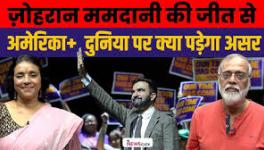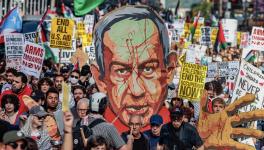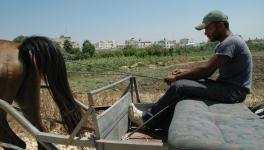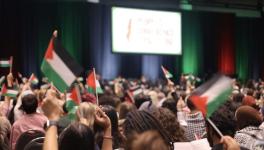After Postponing Elections, Palestinian Authority Moots National Unity Government
Palestinians demonstrate Ramallah against the decision to postpone elections. Photo: ssam Rimawi - Anadolu Agency
Days after postponing the Palestinian general elections scheduled to be held on May 22, the Palestinian Authority (PA) announced that it seeks to form a national unity government, media reports said. The announcement that it would hold dialogues with various political factions comes amid criticism of president Mahmoud Abbas for postponing the polls. Presidential spokesperson Nabil Abu Rudeineh was quoted as telling official Palestine Radio that talks are already underway towards forming the unity government.
Reaffirming the importance of Jerusalem for Palestinians, Abu Rudeineh said that “Jerusalem is the capital of Palestine. The issue is not about elections, and everyone having a reservation on the decision to postpone the elections should understand the US and Israeli game and the regional complicity aiming to establish a fragile entity, which will not be allowed.”
Last week on Friday, PA president Mahmoud Abbas had announced that the Palestinian leadership has decided to “to postpone the elections until the participation of our people in East Jerusalem is guaranteed.” He had also said that if Israel guarantees that it will allow Palestinians in occupied East Jerusalem to participate and vote in the “election without interference, rescheduled elections will be held in Palestine at the earliest.
Israel annexed East Jerusalem in 1967 following the six-day war. According to international law, as well as UN security council resolutions, it is not part of Israel. East Jerusalem is also supposed to be the capital of a future independent, contiguous Palestinian state under any two-state solution to end the occupation.
President Abbas had in January announced elections in Palestine. The national legislative elections were to be held on May 22, presidential elections on July 31, and the elections to the Palestinian national council – the highest decision making body of the Palestine Liberation Organization (PLO) – on August 31. The announcement had been welcomed by various Palestinian factions, as well as by the international community. However, there were always doubts as to whether Israel would cooperate with and allow Palestinian authorities to hold elections in East Jerusalem. There were also doubts regarding Abbas’ commitment to the elections considering his shaky position within his own organization.
The subsequent decision to postpone elections was widely criticized. Protest rallies were held across the occupied Palestinian territories of West Bank and Gaza on Friday and Saturday. The Palestinian group Hamas, which is based in Gaza, condemned the PA’s decision and in a statement said, “We received with regret the Fatah [group] and Palestinian Authority’s decision represented through its chairman, Mr Mahmoud Abbas, to disrupt the Palestinian elections.” Hamas called the postponement “a coup against the path of national partnership and consensus,” and revealed that it had boycotted the meeting held a day before by the Fatah-dominated PA for which other Palestinian political factions were also invited. The Popular Front for the Liberation of Palestine also rejected the decision and called upon all the factions to adhere to the national agreements on holding elections, adding that it will employ all means to reverse this decision.
Internationally, representatives from the United Nations, as well as some major EU countries, also expressed their disappointment at the announcement and called for a new rescheduled “electoral calendar”. Palestinian authorities, in turn, asked the international community to fulfill its responsibility and take actions to apply pressure on Israel to allow the smooth conduct of elections. PLO’s executive committee member, Azzam al-Ahmad, in a statement urged the international community “to play a positive role toward holding the Palestinian elections by exerting pressure on Israel to abide by the agreements it signed with the Palestinians.”
Courtesy: Peoples Dispatch
Get the latest reports & analysis with people's perspective on Protests, movements & deep analytical videos, discussions of the current affairs in your Telegram app. Subscribe to NewsClick's Telegram channel & get Real-Time updates on stories, as they get published on our website.
























